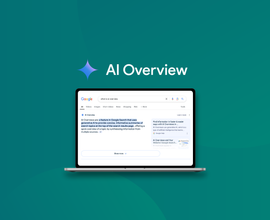Why SEO: What is SEO & Why Is It Important for Business?
Why Is SEO Important for Business?
Whether you’re an in-house marketer, a consultant, or an executive, SEO is important for businesses.
Leveraging an SEO strategy to optimize your web pages can get your business found by the most significant members of customer base through improved search rankings and drive qualified organic traffic to your site.
When creating a rank-able website or content for your business, it’s vital that your SEO efforts are up to speed. It’s important to know how to optimize your content for search engines to gain visibility.
For a quick overview, check out the video below on why SEO matters.
What Is Search Engine Optimization?
What is SEO? You can’t fully appreciate the value of SEO without an understanding of what it is. SEO stands for search engineSearch Engine
A search engine is a website through which users can search internet content.
Learn more optimization—the practice of increasing the quantity and quality of traffic to your website through organic search engine results.
The ultimate goal of SEO for business is to generate organic traffic—searchers clicking through to your website from a search engine results page (SERP).
The vast majority of online experiences begin on a search engine, making search the most used digital tool, which is at the heart of why SEO is so important.
There’s been plenty of chatter about Google’s continually evolving algorithms and how to keep up with them, but it can be much more useful to understand their goal: providing the best experience for the searcher.
SEO and How Search Engines Work
To understand SEO for business, it’s helpful to know how search engines work. Before your website can show up in search results, its pages must be correctly crawled and indexed.
Every search engine has its own crawlersCrawlers
A crawler is a program used by search engines to collect data from the internet.
Learn more, or spiders, which scour the internet and find new web pages. The pages they find are then added to the search engine’s index, which is the record of all pages it has crawled.
When you type a query into the search bar – whether it’s everyday searches or you’re assessing the organic presence of your business – the search engine then goes through the pages in its index, identifies the ones most related to your query, and ranks them according to their relevance. These links are then served to the searcher on the results page.
Better Visibility for Your Business and Website with SEO
Effective SEO isn’t about “gaming” Google or stuffing your content with questionably relevant keywords. SEO requires you to understand what your audience is searching for and create content that satisfies those needs. When you understand their intention—what they’re searching for and where they’re searching, you can match your content with the language customers use when they search and optimize it for search engines. Ultimately, that provides customers with a better user experienceUser Experience
User experience (or UX for short) is a term used to describe the experience a user has with a product.
Learn more as they move from the search engine to the corresponding piece of content on your site.
To understand how SEO helps your business, think about the last time you searched for something on Google. How many results pages did you click through? The average click rate for the top search result on Google is 31.7%, according to one study , and the top three search results on Google account for 75.1% of clicks . That doesn’t leave much traffic for pages that rank lower on SERPs.
A carefully designed SEO strategy helps your content rank and become more visible, climbing higher on SERPs to drive qualified prospects to your content.
Understanding what it is and why SEO works makes it clear how SEO helps your business and the need for search engine optimization to rank higher on SERPs.
Why SEO for Business Should Be a Priority
The importance of SEO for business, begins with making sure your site is discoverable by search engines. An SEO-optimized page takes both users and search engines into account to drive organic traffic by providing relevant content that meets the needs of those searching. That’s why SEO is a top priority for search marketers.
But why SEO is important goes much further than that. Appearing at the top of search engine rankingsRankings
Rankings in SEO refers to a website’s position in the search engine results page.
Learn more builds credibility for your content. Customers today turn to research instead of salespeople, and SEO can let them know about the best deals, brand-new products and services, and the unique benefits you offer—all at the exact moment they’re searching for your solution. Putting that information in their hands when they need it can shorten the buying cycle, leading to increased revenue and greater ROI.
Given the importance of search and the SEO impact on business, it’s no wonder that SEO is playing a more prominent role in digital marketing.
SEO is Earning a Significant Role in Business Marketing
As digital marketing has evolved, SEO has earned a significant role earlier in the planning stages of digital campaigns. Studies have proven that the companies that use SEO as the foundation of their digital marketing efforts see a greater all-around return on investment. The Forrester TEI Report found that SEO greatly enhanced paid search strategy and created more effective pay-per-click campaigns by driving down cost per click through better page rank and quality scores.
Your audience won’t be able to find the marketing content you create if you aren’t integrating SEO into your strategy. When you leverage SEO data as a key factor in your marketing strategies, your website will climb in both keywordKeyword
A keyword is what users write into a search engine when they want to find something specific.
Learn more and SERP rankings, ensuring your content reaches its intended audiences.
Quality Content is Needed for SEO
SEO isn’t just about your website’s backend architecture or the way things are laid out on a page. The content of a given page is also a critical component of SEO and should speak directly to what users are searching for.
Content Quality
Search engines prioritize pages with high-quality content over those that are spammy or don’t provide valuable information. Google in particular looks for content that follows its E-A-T guidelines, which pertain to a page’s Expertise, Authority, and Trustworthiness. This is especially the case for pages about medical, financial, and health topics.
Content Relevance
The goal of search engines is to present content to searchers that is most likely to be helpful for their query. Keyword research can reveal topics that are of interest to your audience, while also helping you better understand their voice and what’s important to them.
How SEO Helps Your Business Beat the Competition
One of the key benefits of SEO is that it’s an inbound marketing strategy that cultivates qualified leads. When a customer searches for your product or service, the likelihood is high that they’re already considering doing business with you or a competitor. If you can reach that customer through organic search, you’re reaching them before the competitionCompetition
Businesses generally know who their competitors are on the open market. But are they the same companies you need to fight to get the best placement for your website? Not necessarily!
Learn more does at a key moment in the buyer’s journey—and you’re doing it without spending precious ad dollars to deliver your marketing message.
Well-ranked content performs 10 times as well as its paid counterpart and gives you helpful insights into audience intent.
What is an SEO Competitive Analysis?
Competitive analysis in SEO is the process of identifying any website that outranks you for the keywords and topics relevant to your business. A proactive approach helps you understand:
- Where keyword opportunities are
- The types of content users engage with
- SEO strategies that work for your competitors
- Where you should focus your time to optimize
- Who are your direct and indirect competitors for organic traffic
Your business might have conducted a competitive analysis for everything from product development to marketing strategy, but it’s important to be aware that your main competitors may differ from those competing for rankings. That’s why an SEO analysis of the competitive landscape can help you identify which brands to pay attention to for your business SEO strategy.
A Competitive Analysis Can Improve SEO Results for Your Business
Performing a competitive analysis of SEO for your business through a deep, continuous process gives you a competitive advantage in your SEO efforts. An advanced SEO technology platform like Conductor can be a weapon in your marketing technology arsenal and give you a distinct competitive advantage in your industry.
Check out our competitive SEO analysis platform to track your market share by category, device type, location, rank, and more. See your competitors’ most trafficked pages, the keywords they rank for, and other insights you can use for your own SEO strategy.
You need tools that can assist with SEO tasks for your business, be it an enterprise or startup. Look for features that help with the following:
- Innovation gives you creative ideas for future SEO campaigns, such as keywords that may not have been accounted for during the content ideation process. Discovering topics that turn searchers into customers.
- Automation aggregates data sets into a report. Save time when you don’t need to dedicate time to put raw data into readable formats.
- Integration aligns strategies and verticals between teams. Campaigns are more successful when there’s a team goal.
How to Conduct an SEO Competitive Analysis
- Identify the competition: Analyze your competition based on the search terms they’re ranking for. This will help you better understand their initiatives, the types of content that drives traffic to their website, and how they’re positioning themselves in your industry.
- Compare content and rankings with competitors: You’ll likely discover previously unknown competition ranking for the keywords you’re focusing on. This will allow you to identify the full scope of brands and publishers that are competing with you for visitors.
- Discover content opportunities to outrank the competition: Never assume. Base your SEO efforts on facts you’ve gathered by assessing the competitive landscape, conducting on- and off-page analysis, and analyzing your competitor’s marketing strategies.
- Create or optimize existing content: Identify where your pages rank for target keywords. Then look for opportunities to optimize existing content on your website. Keywords that rank on the second page of search results often present the best opportunity for improvement. If your target keywords are ranking too far away from the first SERP (or aren’t ranking at all), consider creating new content that is valuable for customers.
Is SEO Important for Every Type of Business?
SEO can drive growth and results for just about any type of business, and we have the SEO case studies and customer stories to prove it. From global leaders to innovative startups, we’ve seen businesses have success in all types of industries including:
- Consulting
- Ecommerce
- Education
- Fashion
- Financial services
- Healthcare
- Manufacturing
- Retail
- Technology
Whether your company is small or large, has a storefront or is online, SEO is important for your business. SEO is constantly evolving, and every business looking to establish an online presence needs to focus on SEO at some level. While older techniques like keyword stuffing are now obsolete and even punishable, new ones have taken their place. What hasn’t changed is that high-quality content that offers value to the user can benefit from thoughtfully incorporated keywords.
Your digital presence today is probably the most important thing you manage. Having that organic presence managed well is not easy… It gives you a real advantage in the marketplace to have a platform as powerful as Conductor in your arsenal.
As search engines continue to update their algorithms and reward websites for following search guidelines, marketers need to adapt their SEO strategies to stay ahead of the competition.
Industry-specific research helps your business understand customer needs, making it easier to answer a searcher’s questions or create content that stands out from the competition. Many websites find SEO success by addressing and writing about problems specific to their audience. Others use insights into customer behavior to blend informative content with a tool that allows visitors to act on what they need.
Scott Messina, Director of Search and Design Strategy at Samsung, says, “It all boils down to, ‘What is the person searching for? What is it they actually wanted? And do we have answers for that?’”
Keyword Research is the Foundation of Business SEO
Keyword research, a fundamental practice in SEO for business, is the process by which you research popular search terms people type into search engines. You then include these phrases strategically throughout your website so that your content appears higher in SERPs.
The keyword research step should underpin any SEO initiative for the best opportunity to rank well for the topics relevant to your business. Higher rankings generally equate to more organic traffic to your website.
The best keyword is a term or phrase that:
- Is frequently searched by your target audience
- Is relevant to the topic of your content
- Is it realistically one your site can rank for
Why Should Your Business Analyze Keywords?
Keyword analysis is a science. Analyzing keywords enables your marketing team to prioritize and focus on using the phrases that will drive the best results. There are a number of factors to look at when determining the value of a given keyword:
- Search volume: On average (usually monthly), how many people search the keyword or phrase?
- Competition: How difficult will it be for your website to rank for the keyword?
- Intent: Is the person searching on the keyword looking for information or are they looking to buy?
- Relevance: Does the keyword align with and have the same meaning as your product or service?
To avoid missing out on new visitors, your team must understand there are variations, misspellings, and even different ways of saying the same thing. You can’t simply target an exact match of one keyword and be done.
Our Suggested Keyword Research Process for Your Business
Create a plan for the keywords you already rank for and those you want to rank for. An easy structure to follow is the PIE method, which we recommend to our customers at the beginning of our onboarding process.
PIE stands for Protect, Improve, and Expand.
- Protect: This slice is concerned with keywords that you already rank for and want to maintain where they’re at. You’re protecting their position. An example of this might be your brand name or a keyword that’s related to your product or service.
- Improve: This slice deals with opportunistic keywords where you might rank beyond the first page search results and want to improve upon the position. Sometimes it takes only a few tweaks to increase the authority of your pages to with these “low-hanging fruit” terms.
- Expand: This slice is for keywords that perform well in your PPC campaigns but don’t have organic visibility for your business. They don’t rank and they’re likely new to your campaign.
Learn how Conductor can help boost your SEO, traffic, and business results.
A truly great SEO platform functions as a partner with brands to scale their organic marketing programs to create valuable content, ensure that it appears in search results and helps you measure results. Conductor earned the highest score in The Forrester Wave search Engine Optimization (SEO) Platforms, Q3 2020.
It’s not just the experts raving about Conductor. We’re also rated number one by customers on Trustradius and G2 .

![Louis Cohen, Director of Digital Marketing & Demand Generation Leader, [object Object]](https://cdn.sanity.io/images/tkl0o0xu/production/2b9117302b93b99a7bcfd240b50879edb9306bd6-1081x1620.jpg?fit=min&w=100&h=100&dpr=1&q=95)






